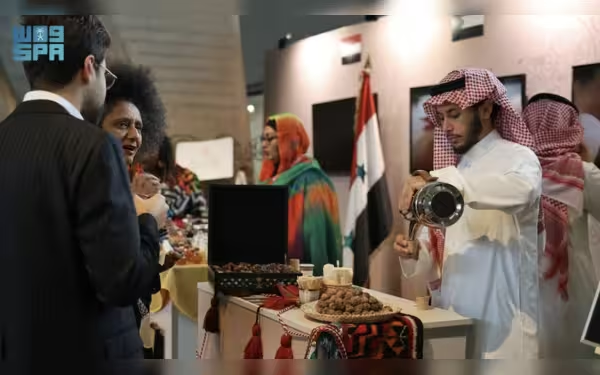Thursday, November 7, 2024 02:42 PM
Saudi Arabia Celebrates Camel Culture at UNESCO Arab Week
- Saudi pavilion highlights camel culture at UNESCO event.
- 2024 declared as 'The Year of the Camel' in Saudi Arabia.
- Camels symbolize national identity and cultural heritage.
 Image Credits: arabnewspk
Image Credits: arabnewspkSaudi Arabia showcases its rich camel culture at UNESCO Arab Week, declaring 2024 as 'The Year of the Camel' to honor its cultural heritage.
In a remarkable celebration of cultural heritage, the Saudi pavilion at UNESCO’s Arab Week in Paris has brought to light the Kingdom’s profound connection to camel culture. This event, which showcases the rich traditions of 22 Arab nations, serves as a platform to explore the significance of camels in Saudi Arabia, highlighting their role as not just animals, but as vital symbols of the nation’s identity and civilization.
Camels have been an integral part of Saudi life for centuries. Historically, they were essential for transportation and provided resources such as milk and wool. However, their importance transcends mere utility; they have evolved into cultural icons that embody the values and spirit of the Kingdom. The exhibits at the Saudi pavilion illustrate this evolution, showcasing how camels are woven into the fabric of Saudi customs, traditions, and even literature, including poetry and proverbs.
In a significant move to honor this cultural heritage, the Saudi Ministry of Culture has declared 2024 as “The Year of the Camel.” This initiative aims to reinforce the status of camels as a national symbol and a cornerstone of Arabian cultural identity. Throughout the Kingdom, camels are celebrated in various ways, including dedicated festivals, racing events, and specialized clubs and research centers that focus on these majestic animals.
The opening of UNESCO’s Arab Week on Monday was attended by a diverse group of guests, including Saudi envoys, ambassadors from other nations, and international diplomats stationed in France. This gathering not only underscores the importance of cultural exchange but also highlights Saudi Arabia’s role in promoting Arab heritage on a global stage.
As we reflect on the significance of camel culture, it becomes clear that these animals are more than just a part of Saudi history; they are a living testament to the resilience and richness of Arabian culture. By celebrating camels, the Kingdom is not only preserving its heritage but also sharing its unique story with the world. This initiative serves as a reminder of the importance of cultural identity in an increasingly globalized world, encouraging us all to appreciate and honor the traditions that shape our societies.













